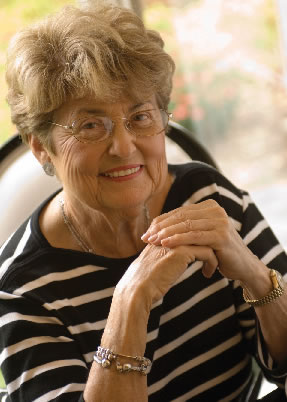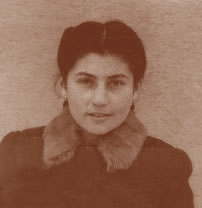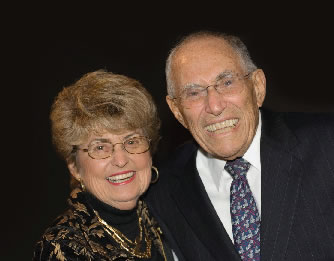 Born in Vilna, Poland (now Belarus) in 1935, Linda Schwab spent her earliest years in the lakeside resort town of Mjadel, where her father, Henry Swidler, ran a successful dry goods store. She says that while her father’s business prospered, he also became known for his generosity.
Born in Vilna, Poland (now Belarus) in 1935, Linda Schwab spent her earliest years in the lakeside resort town of Mjadel, where her father, Henry Swidler, ran a successful dry goods store. She says that while her father’s business prospered, he also became known for his generosity.
“If someone came for fabric – like one woman who needed to make her daughter’s wedding dress – but didn’t have enough money, he would tell them to take it anyway,” Schwab said. “He would tell them, ‘When you have money, you will pay me.’” He allowed the hungry and poor to get milk from his cows and to take fruit from the orchards on his property.
The family’s serene life ended abruptly in 1941 when Germany invaded Mjadel, forcing the Swidlers and other Jews to leave their homes and move to a ghetto. Though only six years old, Schwab clearly remembers being forced to wear a yellow star on her clothing designating that she was Jewish.
She also remembers watching through a window as Jewish men were tortured, not knowing if her father was among them. And, she remembers her aunts “tearing at their hair” in grief when their husbands were killed.
Henry Swidler was spared and managed to gather his wife, his three children and his sister and her daughter and flee to the countryside. There, a Christian farmer whom Swidler had helped many times risked his own safety to hide the family in his basement. When this arrangement became too dangerous, the family fled to the forest where Swidler, again aided by the farmer, dug a cave in the ground, taking care to dump the extra dirt in the river so it wouldn’t be seen, and covering the entrance with trees and brush.
Schwab and her family hid in the forest for two long years. At safe times, the adults told stories – she remembers her father telling Bible stories. Her mother taught the children arithmetic and poetry. Neither Schwab nor her brother, Harold, recall playing. At night, her father would return to the village, foraging for food and returning with bread and potatoes.
Other times were not safe. Schwab recalls once hiding among brush piles and haystacks, listening to the sounds of German soldiers advancing as she lay with her cheek pressed to the ground. Her father spooned rain water from a puddle to quench her thirst while they waited.
Suddenly, she heard an order shouted. “Turn right.” The soldiers changed course and the family was spared again.
Soon after, the family learned that the Russians, who they felt would save them, were approaching nearby. Schwab described the jubilant scene in a Harrisburg Patriot News interview in 2001:
“With that, he [her father] ran back to get all of us. Can you picture this? It’s April, just getting warm. All of us went running to the road. No one is hungry. No one is thirsty. No one is scared. You forget about everything else. We were liberated.”
Making a New Life
 After the war and fearing life under Russian rule, the Swidlers again fled, this time taking a train to Berlin, Germany, and hoping to settle eventually in Israel. The family instead landed in Foehrenwald, a displaced persons camp in the American zone of occupation in a small town near Munich. The U.S. Holocaust Museum lists Foehrenwald as one of the largest Jewish displaced persons centers in the American zone and describes it as having had a “rich educational and cultural life.” There, Schwab first went to school and learned how to speak Hebrew and several other languages – Russian, German, Belarusian, and Yiddish – as she encountered people of many backgrounds.
After the war and fearing life under Russian rule, the Swidlers again fled, this time taking a train to Berlin, Germany, and hoping to settle eventually in Israel. The family instead landed in Foehrenwald, a displaced persons camp in the American zone of occupation in a small town near Munich. The U.S. Holocaust Museum lists Foehrenwald as one of the largest Jewish displaced persons centers in the American zone and describes it as having had a “rich educational and cultural life.” There, Schwab first went to school and learned how to speak Hebrew and several other languages – Russian, German, Belarusian, and Yiddish – as she encountered people of many backgrounds.
The Swidlers spent three years at Foehrenwald before deciding to travel to America where Linda’s mother had relatives. U.S. policy required immigrants to have a sponsor, so Mrs. Swidler wrote to her cousin David Schwab in Binghamton, N.Y. He agreed to sponsor them and brought them first to New York and then to Harrisburg, where he had relatives. The Swidlers created a new life in Pennsylvania and Linda eventually married David’s son Morris, her husband of 23 years who passed away in December 2006.
Preserving History
 For many years, Schwab was uncomfortable talking about her Holocaust experience. Finally, in the early 1990s, at the urging of educators including professors at Penn State Harrisburg, she publicly recounted her story for the first time – to an auditorium of school children at a Christian school in Harrisburg.
For many years, Schwab was uncomfortable talking about her Holocaust experience. Finally, in the early 1990s, at the urging of educators including professors at Penn State Harrisburg, she publicly recounted her story for the first time – to an auditorium of school children at a Christian school in Harrisburg.
“They were studying the Holocaust,” she explains, “and the school wanted someone without a heavy accent to speak to the children so they would understand. How could I say no? After all, I was their age when it all happened. It hurt me to talk about it, but the experience was unbelievable.” The children and their teachers listened intently and asked questions eagerly.
Schwab said she began to realize it was important to tell the story of the Holocaust so it would not be forgotten as the generation that experienced it firsthand passes on. In the 1990s, she also participated in Steven Spielberg’s Shoah Foundation project to chronicle Holocaust survivor memoirs worldwide. Today, the foundation has compiled an archive of nearly 52,000 testimonials in 32 languages.
Schwab also stresses the importance of young people, Jews and non-Jews, learning about the Holocaust. “They are the bridge to tomorrow,” she says.
To that end, Schwab and her husband Morris helped create an endowment fund named Gesher L’Machar, Hebrew for “Bridge to Tomorrow.” The fund supports local teenagers who wish to participate in the March of the Living, an annual trip to Poland and Israel to study the Holocaust. The Schwabs also established a Holocaust essay contest in conjunction with The Patriot-News that awards scholarships to winning writers in middle school and high school.
And now, Schwab has made a permanent commitment to telling the Holocaust story. Through a generous donation to Penn State Harrisburg, Schwab and her late husband have supported creation of the Schwab Family Holocaust Reading Room in the college library. The reading room will be the college’s Holocaust and Jewish Studies Center focal point, housing resources and preserving local connections to the Holocaust. Mrs. Schwab said Penn State Harrisburg was the ideal place to establish the reading room because it recognizes their family allegiance to Penn State – Morris Schwab was a 1940 University Park graduate and active alumni volunteer – at the University’s campus closest to Harrisburg, where she has spent most of her life.
Schwab’s decision to speak and her extraordinary steps to ensure that a history of the Holocaust is preserved in Central Pennsylvania are particularly relevant and timely. As recently as this past winter, Holocaust revisionists – those who believe the Holocaust did not occur – continued to make news headlines worldwide.
Linda Schwab is a witness to history and a survivor.
“I felt I was left alive – I was saved by God,” Schwab says, “so that people will remember this really happened.”